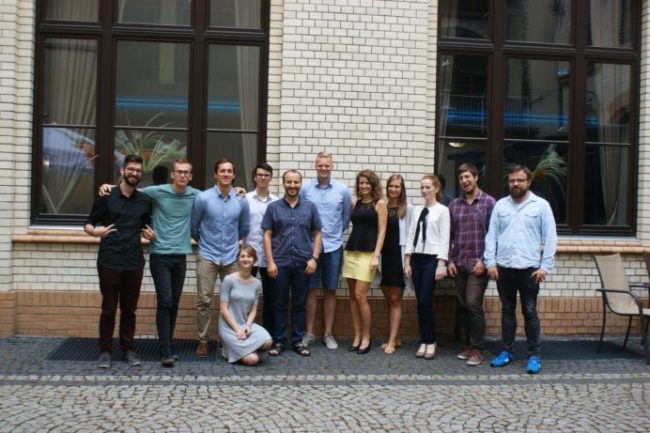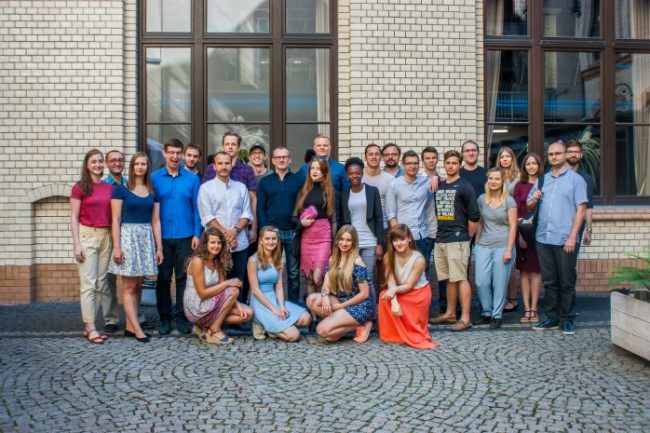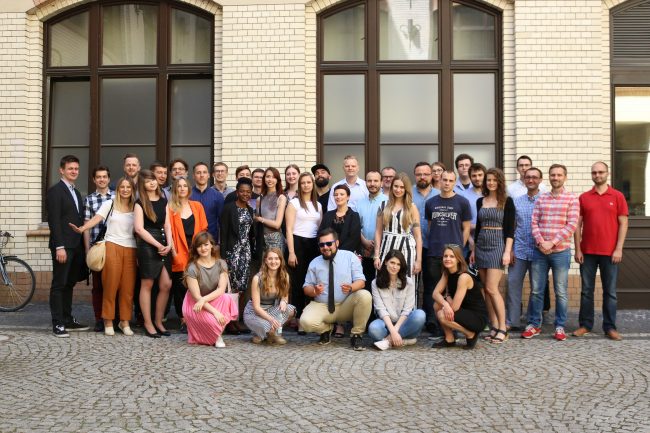Recently our CEO Matt Tarczynski, together with two other start-up founders, took part in an interview broadcasted by Radio Wroclaw. They engaged in an interesting discussion about modern labor market trends, the role of a leader in the modern world and Millennials’ attitude towards work, money, and life in general.
Between the lines, Matt gave some first-hand insights about the core values we live by in Woodpecker. Read more what principles we cherish at Woodpecker.
As you might remember, Cathy and Mary write a small summary after each Woodpecker meeting — an annual gathering of all Woodpecker employees meant to bring us closer together and update us about our day-to-day task.
There were three meetings so far. In those summaries, they include a little update about the growth of the company, including the number of Woodpecker team members.
Here’s a photo from the first meeting that took place in 2016

There were 15 of us back then. Read more about it here >>
Next year, our team has grown to 29 people. We haven’t missed the chance to take a group photo. Here is the photo from the second Woodpecker meeting >>

And the most recent meeting was in May 2018. The Woodpecker team has counted 40. We took a traditional group photo on the brick wall background and then wrote a quick recap on the blog >>

Even though there are so many of us we haven’t forgotten what we stand by and we hope other people notice that every time they visit our headquarters. Listening to our CEO’s interview for the local radio station, you can discern the principles below. And if you have a startup like ours, I believe there are some takeaways for you too.
#1. Work is not all about money
Modern labor market shifts away from the traditional job paradigm. Young people want more from a job than merely be the source of financial security. Money is not everything anymore.
Millennials don’t want to pursue wealth at any cost. They value the idea behind the job. If the work they perform on a daily basis makes a difference in the world, is helpful and changes something for better, then it makes sense to them to devote their time and energy on what they do.
In Woodpecker we put a strong emphasis on the “why” deeply rooted in our company’s values. We have a goal to help businesses grow independently and make people’s life easier. Each employee truly contributes to achieving this objective through their day-to-day work. Each team member has an impact on Woodpecker’s further development thanks to their engagement and proactivity.
#2. Work is all about development
Modern job paradigm gives daily work another dimension – self-fulfillment. Employees strive for professional and personal development. They don’t want to waste 8 hours of their life in front of the computer. They give the company their time and effort, but they want growth opportunities in exchange.
The key shift from traditional to modern job model is understanding employee’s need for development and aligning it with company’s needs. This way an employee can work on their own growth as well as the company’s success.
In Woodpecker we want the employees to feel that their needs are taken into account. Their growth equals our growth after all. We are fully aware that by investing in our team members, we also invest in the future of the company.
#3. Work is about partnership
Fortunately, the role of a leader evolves too. The archetype of a controlling, strict boss to be feared remains the horror of the past. A modern leader has a new approach to management.
Matt emphasizes that he treats new employees as partners from the very beginning. He offers them cooperation on developing a product that helps other companies achieve their goals. It’s an appreciation of a person’s knowledge, skills, and experience. This new approach makes an employee feel valuable instead of being “just another brick in the wall”.
Matt sums up the role of a modern leader:
Employees look for leaders to follow. They look for mentors. They look for people who they can learn something from. I believe it works both ways. It’s never a one-way learning process. If they come across such a person, they stay engaged for a long time. If they don’t – they go somewhere else. Simple as that.
A leader is a person who pulls the whole team forward. A leader should be the example to follow, not a slave driver who only gives orders. Rather than holding the whip, a leader should pull the carriage. Employees follow leaders who are wholeheartedly engaged in the project and strongly believe in the idea behind it.
I think everybody agrees that the changes in the role of a leader go in the right direction.
The importance of cultivating a healthy work culture
Some time ago, during a conference for local companies and startups, Wojtek Blazalek, our Head of Integration and Deliverability, gave a presentation about the values we cherish and work by in Woodpecker. In our work environment, we do our best to follow the below 10 rules rooted in the philosophy of a teal organization, analogical to the ones described by prof. Blikle:
- Look for the cause to be removed, not the culprit to be punished.
- Expect progress, which is always possible, instead of perfection, which is impossible to achieve.
- Support cooperation, not competition that destroys partnership.
- Be appreciative – it gives strength, don’t be judgmental – it clips wings.
- Give constructive feedback – talk about what can be improved, not only about what is wrong.
- Ask the employees what improves their daily work, not what they could do better.
- Build the organization on trust, not control.
- Explain how you feel about something, instead of saying that someone is upset.
- Give autonomy, don’t be too restrictive in your employee management.
- Be a teacher, a moderator, and a student. Don’t be a supervisor.
We aim at cultivating a work culture based on partnership, trust, transparency and good communication. We believe that we can learn from one another. Everybody’s voice is equally important and taken into account.
***
You can listen to the full interview with Matt in Polish on Radio Wrocław’s page.
READ ALSO

2018 in Review – The One We Thank You For the Awesome Year
A lot has happened last year. Woodpecker had many feature updates, launches, and overall company growth. Suffice it to say that we have many good things to share with you. I'd love to sum up 2018 at Woodpecker with you today so that we can enter the new year full of fresh ideas. What do you think?

5 Ways a SaaS Sales Team Can Cooperate with Marketing for Better Lead Generation
Marketing and sales used to be portrayed in stark contrast. Nowadays, there's an ongoing trend to go for "sales and marketing alignment" -- that is, making the two teams work together. There's little information on how to do it exactly. Many focus on improving the flow of information between the two departments. Is that all that can be done? Today, I'll show you a couple of ways the Woodpecker marketing and sales teams cooperate to create a streamlined lead generation process.

A day in the Life of a SaaS Business Development Team
A business development team is a crucial element of a SaaS company. It plays an important role in business growth and revenue generation. Let’s take a look at the backstage of their job. I’ve prepared this post in collaboration with Yurii Veremchuk, the Head of Woodpecker Business Development Team, who shared some first-hand insights into the day-to-day work of his team and the challenges they face, described the tools that improve their efficiency, and gave his advice for B2B sales newbies.

